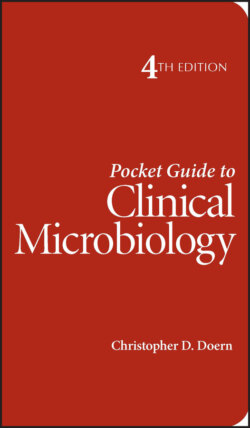Читать книгу Pocket Guide to Clinical Microbiology - Christopher D. Doern - Страница 13
SECTION 1
Taxonomic Classification of Medically Important Microorganisms
ОглавлениеGeneral Comments
Taxonomic Classification of Bacteria
Taxonomic Classification of Human Viruses
Taxonomic Classification of Fungi
Taxonomic Classification of Parasites
In order to remain true to the tradition set forth by the first three editions of this pocket guide, the first section will be devoted to describing the taxonomy of common (and some uncommon) organisms which are associated with humans and may be isolated by the Clinical Microbiology Laboratory. Unfortunately, in the 13 or so years that have passed since the third edition of the Pocket Guide was published, the rate of taxonomic changes has continued to increase such that publishing a taxonomic list of organisms would be out of date before this book goes to publication. This is a product of continued proliferation of new species of organisms which are being identified by increasingly sophisticated genomic analyses. As such, the revised goal of this section will be to outline some high-level taxonomic groupings and provide the resources and references one would need to identify the most up-to-date taxonomic classifications.
It should be appreciated that despite appearances, changes in nomenclature are regulated by a system of rules with oversight governed by the International Code of Biological Nomenclature (www.biosis.org.uk/zrdocs/codes/codes.htm). The International Code of Nomenclature of Bacteria governs bacterial taxonomy, and all bacteria named after 1980 must be validly published in the International Journal of Systematic and Evolutionary Microbiology. A current listing of bacteria can be found at http://www.bacterio.net, http://www.bacterio.cict.fr/, and https://www.dsmz.de/. The International Committee on Taxonomy of Viruses (ICTV) governs viral taxonomy, and all currently recognized viruses can be found at https://talk.ictvonline.org//. The International Code of Botanical Nomenclature governs fungal classification, and additional information can be found at http://www.iapt-taxon.org/nomen/main.php/.
